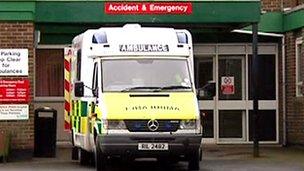Belfast paramedics describe hospital 'chaos'
- Published
.jpg)
Paramedics said they were waiting for hours with patients at the Ulster Hospital
Belfast's accident and emergency service is in chaos, paramedics who had to wait for hours with patients on Monday night have claimed.
One paramedic told the BBC he had to wait for more than four hours in a corridor with a patient at the Ulster Hospital in Dundonald.
He said as a result he was unavailable to respond to other emergency calls.
The paramedic said the closure of Belfast City Hospital A&E in 2011 had had a major impact on the situation.
He said he had joined the ambulance service to help people, but it was becoming more and more difficult to do so.
He also pointed out that there had previously been 14 emergency ambulances in Belfast, but now there were seven.
Since Belfast City Hospital's A&E closed in 2011, the number of people attending the Ulster Hospital is up by 10,000 a year.
BBC Northern Ireland health correspondent Marie Louise Connolly said: "I understand that ambulance services were particularly stretched last night both at the Royal Victoria Hospital and at the Ulster Hospital.
"I received calls from paramedics and then their stories were later confirmed by patients at both hospitals.
"At one stage, in the Ulster Hospital, I'm told that five or six vehicles were queued up waiting to bring patients inside - they had been diverted away from the Royal Victoria Hospital.

More than 60 ambulances arrived at one hospital on Monday
"The paramedics who we have spoken to they have asked us to protect their identity but one described the scene as chaotic another said it was embarrassing.
"They were left standing with patients who had called an emergency vehicle so obviously they were ill, they said the situation was particularly tense and it was embarrassing as some patients were trying to help them to help other patients."
However, a doctor at the Royal Victoria Hospital disputed that ambulances had been diverted away from that hospital.
He said, in the main, the hospital had been receiving patients from South Eastern Trust areas, despite severe pressure on its A&E.
The doctor said the issues go much deeper than the casualty departments and were primarily associated with the "corporate attitude" to emergency care.
'Life-threatening'
John McPoland, from the Ambulance Service, said there would always be times when the service was under extra pressure.
"A call may come in as a category A (most serious), but it may change when the paramedics have arrived because of the treatment they give and then, when they get to the hospital, the condition of the patient may not necessitate a life-saving intervention," he said.
"Anybody with a life-threatening condition will be seen immediately in the hospital.
"Yesterday we dealt with 391 emergency calls, we took 66 patients to the Ulster Hospital.
"Ten of those patients, according to the figures I have, had to wait for up to three hours and two waited for more than three hours in the care of our paramedics.
"We cope with the demand as best as we possibly can."
Dr Sean McGovern, a consultant from the South Eastern Trust, said 66 ambulances had arrived at the Ulster Hospital on Monday, 20% above average.
He said there was a changing demographic in terms of an ageing population but there was also a shortage of beds at the hospital.
Chairman of the Health Committee Sue Ramsey said problems with waiting times in emergency departments had been a concern for a number of years.
She said she had been given assurances that problems had been tackled adding: "Here we are again."
"This is human beings we are talking about," she said.
"We need to hear from the minister. The minister needs to now tell us, is the action group he set up last April working? We need to hear from him and what the next step is."
- Published5 February 2013
- Published15 January 2013
- Published29 February 2012
- Published21 March 2012
- Published23 November 2010